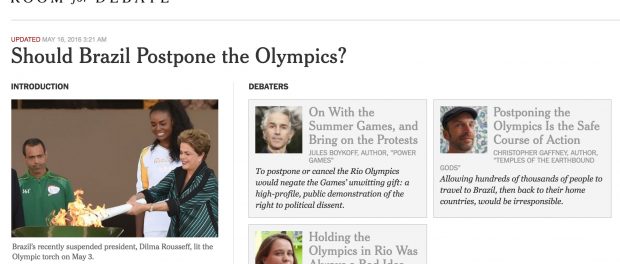Rio will host a trouble-free Olympics by doing what it does best: covering up the damage and showing its artificial face.
Our Opinion Piece on Whether to Postpone the Olympics in New York Times Debate Forum
Click here for article published in the New York Times Room for Debate Forum on May 16, 2016.
Holding the Olympics in Rio Was Always a Bad Idea
Theresa Williamson, a city planner, is the executive director of Catalytic Communities, a Rio de Janeiro-based organization that provides media and networking support to favela communities, and the editor of RioOnWatch.
Whether Rio de Janeiro can host the Games has little to do with the political or financial crisis — Rio will host a trouble-free Olympics by doing what it does best: covering up the damage and showing its artificial face. Residents of favelas will be on lock-down, schools will be closed, protesters will be kept at bay because of fears of police repression, businesses may even be asked to close so that traffic will flow and attendees can have their carefree experience. The city is charming and is used to entertaining — we do it every year for carnival and New Year’s.
The infrastructure has been built, 77,000 peoplehave been evicted from their homes, police killings of innocents in favelas have spiked as the state attempts to present an image of security, our lowest income citizens have already been pushed to the urban fringe under lock-and-key militia watch, the damage has been done.
The Olympics should not have been held in Rio in the first place. We could have foreseen such damage in a city that has a history of only building to show off and not serving its citizens. Of all Brazilian cities, Rio de Janeiro has the largest percentage of residents living in favelas, which by nature are underserved neighborhoods — itself a testament to historic public neglect and misplaced priorities. And not coincidentally Rio was the world’s largest slave port, the same port now being unscrupulously whitewashed. The Olympics in Rio was a very bad idea.
But this doesn’t affect the International Olympic Committee, real estate speculators or construction firms — those this city administration is worried about impressing. It affects the everyday citizens who have missed out on a huge opportunity for investment that could have benefited them had it been applied through a consultative, well-implemented planning process, aimed truly at making Rio functional, inclusive and even more vibrant. All that money put to increase segregation and exacerbate inequality! What a waste and oh, how counterproductive in a city already infamous for its inequality.


